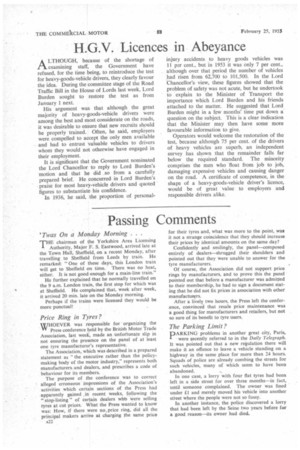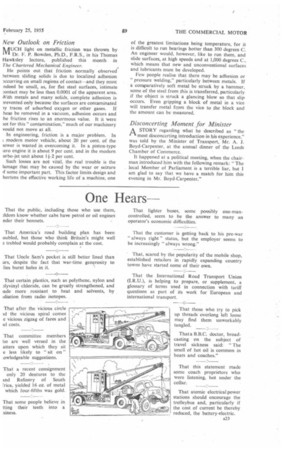Passing Comments
Page 24

Page 25

If you've noticed an error in this article please click here to report it so we can fix it.
'Twas On a Monday Morning . . .
THE chairman of the Yorkshire Area Licensing I Authority, Major F. S. Eastwood, arrived late at the Town Hall, Sheffield, on a recent Monday, after travelling to Sheffield from Leeds by train. He remarked: "One of these days, this London train will get to Sheffield on time. There was no heat, either. It is not good enough for a main-line train." He further explained that he normally travelled on the 9 a.m. London train, the first stop for which was at Sheffield. He complained that, week after week, it arrived 20 min. late on the Monday morning.
Perhaps if the trains were licensed they would be more punctual!
Price Ring in Tyres?
WHOEVER was responsible for organizing the " Press conference held by the British Motor Trade Association, last week, made an unfoftunate slip in not ensuring the presence on the panel of at least one tyre manufacturer's representative.
The Association, which was described in a prepared statement as "the executive rather than the policymaking body of the motor industry," represents both Manufacturers and dealers, and prescribes a code of behaviour for its members.
The purpose of the conference was to correct alleged erroneous impressions of the Association's activities which certain sections of the Press had apparently gained in recent weeks, following the "stop-listing" of certain dealers whb were selling tyres at cut prices. What the Press wanted to know was: How, if there were no. price ring, did all the principal makers arrive at charging the same price A22 for their tyres and, what was more to the point, was it not a strange coincidence that they should increase their prices by identical amounts on the same day?
Confidently and smilingly, the panel—composed entirely of dealers—shrugged their shoulders and pointed out that they were unable to answer for the tyre manufacturers.
Of course, the Association did not support price rings by manufacturers, and to prove this the panel pointed out that before a manufacturer was admitted to their membership, he had to sign a document stating that he did not fix prices in association with other manufactupers.
After a lively two hours, the Press left the conference, convinced that resale price maintenance was a good thing for manufacturers and retailers, but not so sure of its benefit to tyre users.
The Parking Limit?
PARKING problems in another great city, Paris, were wcently referred to in the Daily Telegraph. It was pointed out that a new regulation there will make it an offence to leave a vehicle standing on a highway in the same place for more than 24 hours. Squads of police are already combing the streets for such vehicles, many of which seem to have been abandoned.
In one case, a lorry with four flat tyres had been left in a side street for over three months—in fact, until someone complained. The owner was fined under £1 and merely moved his vehicle into another street where the people were not so fussy.
In another instance, the police discovered a lorry that had been left by the Seine two years before for a good reason—its owner had died.
New Outlook on Friction
NAUCH light on metallic friction was thrown by "I Dr. F. P. Bowden, Ph.D., F.R.S., in his Thomas Hawksley lecture, published this month in The Chartered Mechanical Engineer.
He points out that friction normally observed between sliding solids is due to localized adhesion occurring on small regions of contact—and they must ndeed be small, as, for flat steel surfaces, intimate :ontact may be less than 0.0001 of the apparent area. Nith metals and many solids, complete adhesion is orevented only because the surfaces are contaminated )y traces of adsorbed oxygen or other gases. If hese be removed in a vacuum, adhesion occurs and he friction rises to an enormous value. It it were lot for this " contamination," much of our machinery vould not move at all.
In engineering, friction is a major problem. In L modern motor vehicle, about 20 per cent, of the )ower is wasted in overcoming it. In a piston-type Ler° engine it is about 9 per cent. and in the modern urbo-jet unit about 1i-2 per cent.
Such losses are not vital, the real trouble is the lamage that may be caused by the wear or seizure If some important part. This factor limits design and hortens the effective working life of a machine, one
of the greatest limitations being temperature, for it is difficult to run bearings hotter than 300 degrees C. An engineer would, however, like to run them, and slide surfaces, at high speeds and at 1,000 degrees C., which means that new and unconventional surfaces and lubricants must be developed.
Few people realise that there may be adhesion or " pressure welding," particularly between metals. If a comparatively soft metal be struck by a hammer, some of the steel from this is transferred, particularly if the object is struck a glancing blow so that slip occurs. Even gripping a block of metal in a vice will transfer metal from the vice to the block and the amount can be measured.
Disconcerting Moment for Minister
ASTORY regarding what he described as "the most disconcerting introduction in his experience," was told by the Minister of Transport, Mr. A. J. Boyd-Carpenter, at the annual dinner of the Leeds Chamber of Commerce.
It happened at a political meeting, when the chairman introduced him with the following remark: "The local Member of Parliament is a terrible liar, but I am glad to say that we have a match for him this evening in Mr. Boyd-Carpenter."




















































































